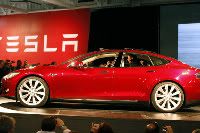EV Adoption Curve Will Benefit from Critical Mass
My friend and colleague Tom Konrad does not share my belief that the consumer adoption of EVs is, to some degree, driven by perception of the long-term prognosis for electric transportation.” He writes:
If I’m buying an EV, why should I care if it’s the way of the future or not? My car will work as long as I have electricity and roads, the supply of neither of which is under threat. Owners of natural gas vehicles may need to worry about charging infrastructure, but while a robust charging network for EVs would be nice, it’s not absolutely necessary. If it works today, it will work 10 years from now.
I think, though it’s just a theory, that most people don’t want to own a form a transportation that few other people use — especially in this case. To the degree EVs do not catch on, there will be very little build-out of charging infrastructure, and very low resale value for used cars.


I admit I’m an outlier… I prefer to be right than fit in. And I agree with you (never disagreed) that a robust charging infrastructure would aid adoption.
But how important is it that people feel that owning EVs is what everyone else is doing/going to do? I think it will become increasingly important as market penetration grows. Today, at <<<1% penetration, I think it's unimportant. When we hit 5% or more, then it will likely be crucial.
Well you, my friend, have always impressed me with your willingness to be the ultimate outlier. Keep up the good work there.
And I think you’re right that the benefit of a critical mass will grow over time.
Watch what happens when peak oil kicks in, the price of gas climbs, and the cost of EVs continued to fall.